Next week’s market movers
- In the US, Fed Chair Yellen will testify before Congress, twice. We expect her to retain an upbeat tone overall, in line with her recent appearances.
- In Sweden, we expect the Riksbank to take the sidelines and to shift to a slightly more optimistic bias in the statement accompanying the decision.
- We also get key data from China, the UK, the US and Sweden.
On Monday, we have a quiet day, with no major events or indicators due to be released.
On Tuesday, during the Asian morning, we get China’s CPI and PPI data for January. The forecast is for both the CPI and the PPI rates to have risen. This would be the 13th consecutive increase in the PPI rate. The forecasts are supported by the nation’s Caixin manufacturing PMI for the month, which showed that inflationary pressures remained sharp, with both input costs and output charges increasing at a pace rarely seen throughout the past five years. With regards to the PBoC, the Bank has been tightening its policy in recent weeks in order to halt some of the depreciation pressure on the yuan. As such, we think that accelerating inflation could allow the Bank to tighten its policy further in the foreseeable future if needed. What’s more, the persistent rise in the PPI rate is likely to be welcomed by foreign central banks struggling to hit their inflation targets, such as the ECB and BoJ. Considering that falling Chinese producer prices between 2012 and 2016 may have held down imported inflation in the Eurozone and Japan, the turnaround in that dynamic may actually boost imported inflation in those nations and thereby, support their overall inflation prints.
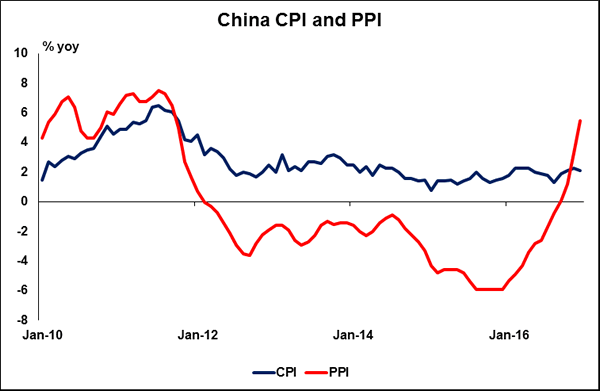
In the US, the main event will be Fed Chair Yellen’s semi-annual testimony on monetary policy before the Senate Banking Committee of Congress. She will present the same testimony before the House of Representatives on Wednesday. Although the testimony will be the same on both occasions, we expect market participants to pay extra attention to the Q&A sessions. In particular they may be on the lookout for any fresh hints regarding her view on the economy, and whether she is likely to vote in favor of a rate hike in the upcoming policy meetings. The Fed Chair was relatively upbeat in her latest speech, indicating that the US is near maximum employment and that inflation is moving toward the Fed’s goal. She also said that the timing of the next rate hike will depend on the economy over the coming months. Given that since then, US data have been generally solid if one overlooks the dissapointing wage growth print in January, we do not see a material reason for Yellen to deviate from her previously optimistic stance.
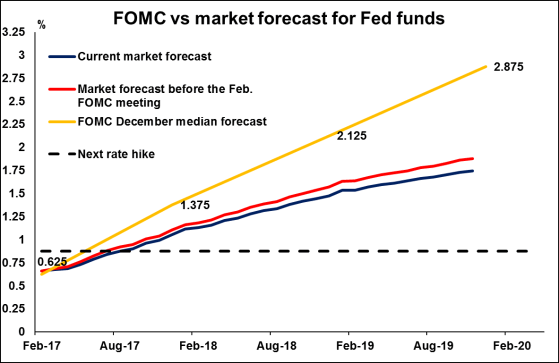
From the UK, we get inflation data for January. The consensus is for both the headline and the core CPI rates to have risen further. The forecasts are supported by the nation’s services PMI for the month, which indicated that inflationary pressures in the sector remained intense, with output charges rising at the same pace as in December, the fastest in 68 months. Nevertheless, we do not expect such an increase in these rates to materially affect the BoE’s neutral policy stance, at least in the short-term.
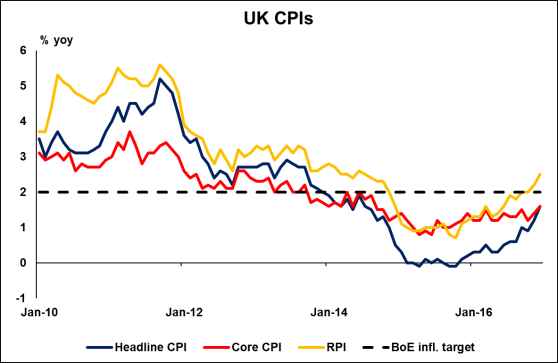
On Wednesday, market participants are likely to turn their gaze to Sweden, where the Riksbank will announce its policy decision. The last time the officials met, they extended the duration of their QE program and maintained a rather sanguine tone in the meeting statement, indicating that the outlook for economic activity in Sweden and abroad has improved somewhat. More importantly, three out of the six Board members entered reservations against extending QE purchases, a move which leads us to conclude that the bar for any further easing is quite high. Bearing this in mind, and that since that gathering the nation’s CPI and CPIF rates for December both surged to reach highs last seen in 2011 and 2012 respectively, we see a very low likelihood for the Bank to take action at this meeting. What’s more, the minutes of the latest meeting showed that even the members who voted in favor of extending QE were quite upbeat on the state of the economy. All these factors suggest to us that the tone of the statement accompanying the decision may be even more confident than last time.
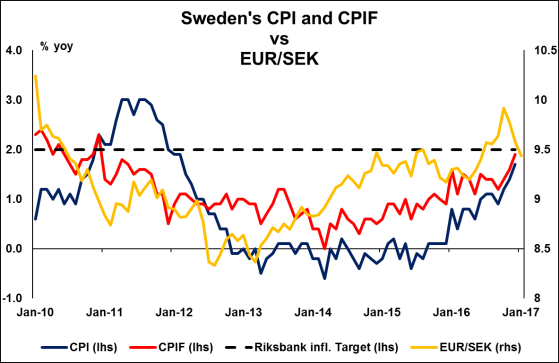
In the UK, employment data for December are due out. Both the unemployment rate and the average weekly earnings rates are forecast to have held steady. We share the view for an unchanged unemployment rate, though we see upside risks for the earnings forecast. We base our reasoning on the services PMI for December, which indicated that employment rose at the same pace as in November, the fastest in 7 months. It also showed that labor costs for service providers rose further. Solid employment data are likely to be another confirmation that the UK economy continues to be unaffected by Brexit uncertainties, at least so far.
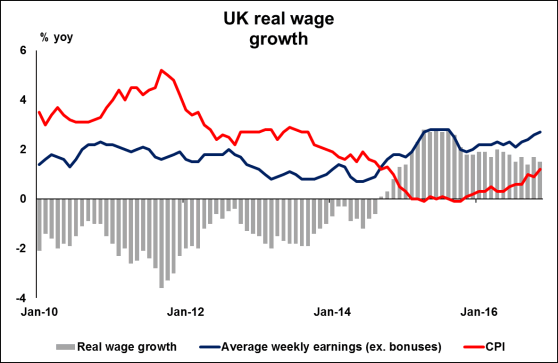
As we already noted, in the US, Fed Chair Yellen will testify before lawmakers again, this time before the House Committee on Financial Services.
With regards to the US economic indicators, we get inflation and retail sales data, all for January. Kicking off with the inflation figures, the headline CPI rate is expected to have risen further, while the core rate is forecast to have held steady. Despite a potential rise in the headline rate, the fact that the core rate remains flat suggests that the progress in headline inflation is mainly due to movements in the prices of volatile items and is thus transitory. What’s more, the core PCE price index rate remained flat in December, further confirming that underlying inflationary pressures are not accelerating.
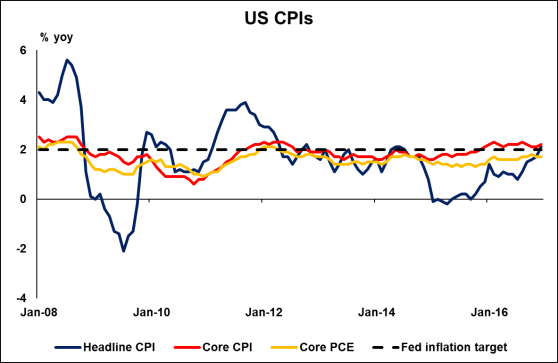
Turning to retail sales, the headline figure is expected to have slowed, while no forecast is available for the core number. Consumer sentiment indicators, such as the Conference Board index and the U of M index were mixed in the month, with the former declining and the latter rising. Nonetheless, the fact that average hourly earnings for the month slowed down by more than expected supports somewhat the forecast for a slowdown in sales.
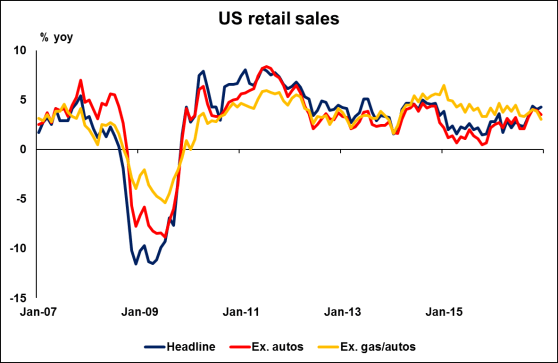
Overall, we do not think that such CPI and retail sales prints will materially affect investors’ expectations with regards to the timing of the next Fed rate hike. We maintain the view that for now, the most likely timing for such action is the June meeting, a view that is slightly more optimistic than current market pricing. At the time of writing, investors expect the next rate hike to come in late August according to the Fed funds futures, which is much closer to the September meeting than the June gathering. What’s more, we think that as we draw closer to the rest of the FOMC meetings this year, another theme that could attract market attention is the size of the Fed’s balance sheet. In particular, we expect investors to focus on whether the Bank will continue to reinvest the assets it purchased under its QE operations. Committee members such as Chicago Fed President Charles Evans recently said that the Bank is in no hurry to halt reinvestment, and that they will discuss this after a few more rate hikes. Nonetheless, we do not think that market participants will wait until the Fed actually debates this in order to begin speculating on this prospect.
On Thursday, the economic agenda is relatively empty, with no major events and only second-tier indicators due to be released.
On Friday, we get the UK retail sales for January. Without a forecast available, we expect sales to have rebounded following a sharp decline in December. This view is supported by the nation’s consumer sentiment indicators, such as the TR/IPSOS and the Gfk indices, both of which showed increased optimism in the month. However, the fact that the BRC (British Retail Consortium) sales monitor unexpectedly fell, suggests to us that any potential rebound in retail sales is likely to be modest.
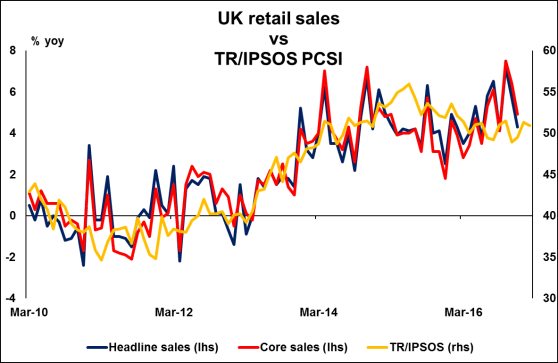
From Sweden, we get the CPI data for January, though we do not have a forecast yet. Considering the notable surge in both the CPI and the CPIF rates in December, which were boosted by temporary factors such as rising airfare prices, we see the case for the rates to have stayed unchanged with risks skewed to the downside. Our view is supported by the fact that SEK surged in the aftermath of the US election and continued to strengthen throughout January, particularly against the euro. This may begin to exert downward pressure on imported prices in the future, thereby being a drag on overall inflation.
